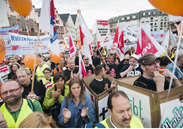MENU
Accès Affiliés
Login
Login

It includes the reinstallation of the framework collective agreement without any changes for another three years until 31 March 2014. This is a great success for ver.di members as it means that the working time of 35 hours per week as well as the main working conditions for employees are again regulated by a sectoral collective agreement.
In a message of appreciation to supporters ver.di said that this result could only have been achieved through the massive strikes and the national and international solidarity. Despite the protracted negotiations graphical members of ver.di continued to support the dispute and through their actions showed that by remaining united and committed to a collective outcome workers can achieve satisfactory outcomes.
The Union received many messages of solidarity and a lot of European support for their long struggle to maintain the collective agreement.
On behalf of their colleagues ver.di thanked all those who stood by their side in these difficult times.
There was a price to pay to maintain the framework collective agreement and that was to accept a wage agreement that lasts for 33 months until 31 December 2013. In September 2011 employees will receive a lump sum of 280 Euros for 2011, in August 2012 the wages will rise by two percent. And in July 2013 employees will receive another lump sum of 150 Euros for 2013.
The wage agreement has yet to be endorsed by the employer’s bodies but lay members in the collective bargaining commission for the printing industry have approved the CA-settlement which will come into force following the employers approval on 22 July 2011.
A comparable framework collective agreement for newspaper and magazine editors - and in some
regions also for other employees in publishing - was denied by the publishing sector’s employers which means that industrial action including strikes by the Journalists may not be over yet.